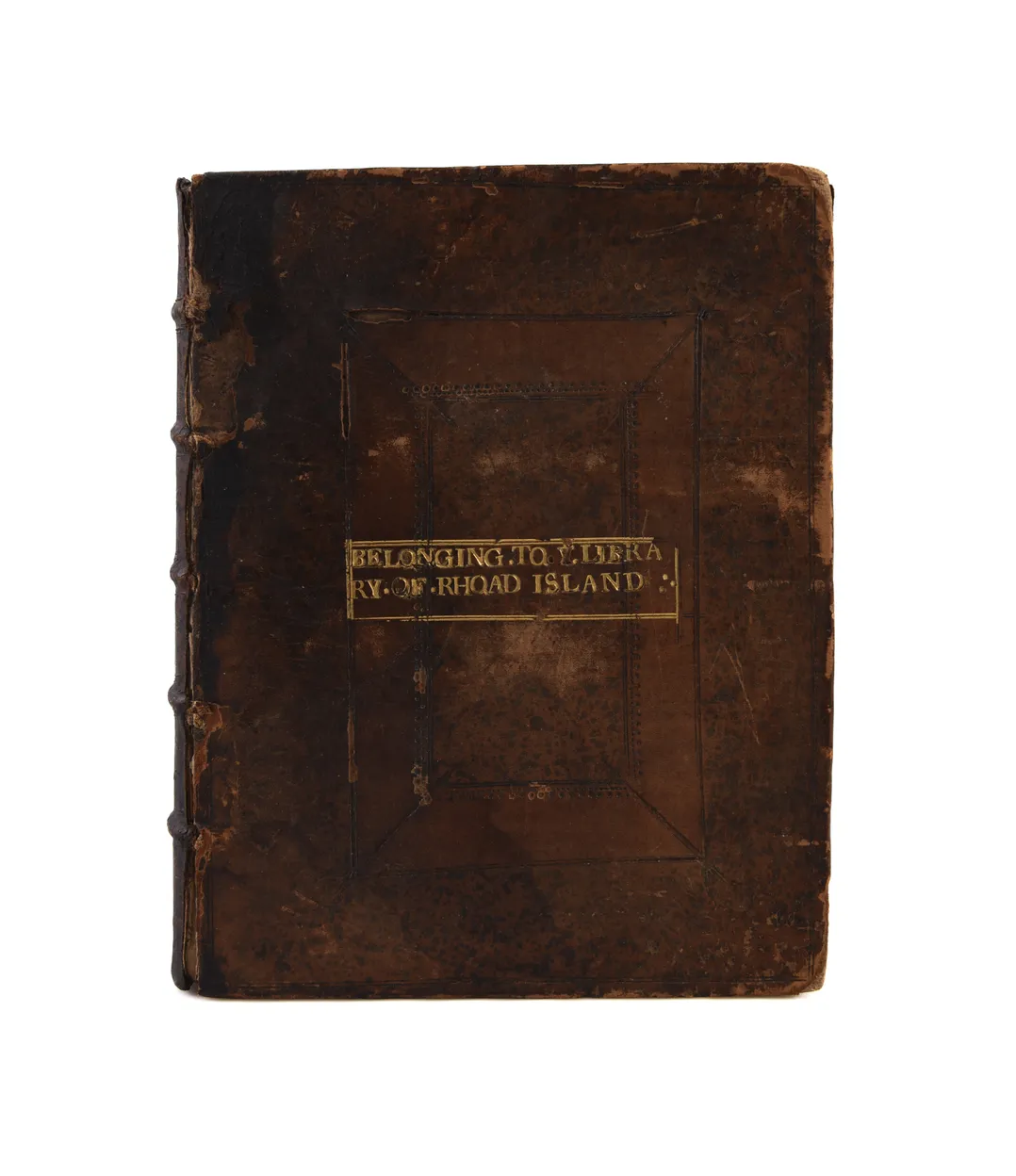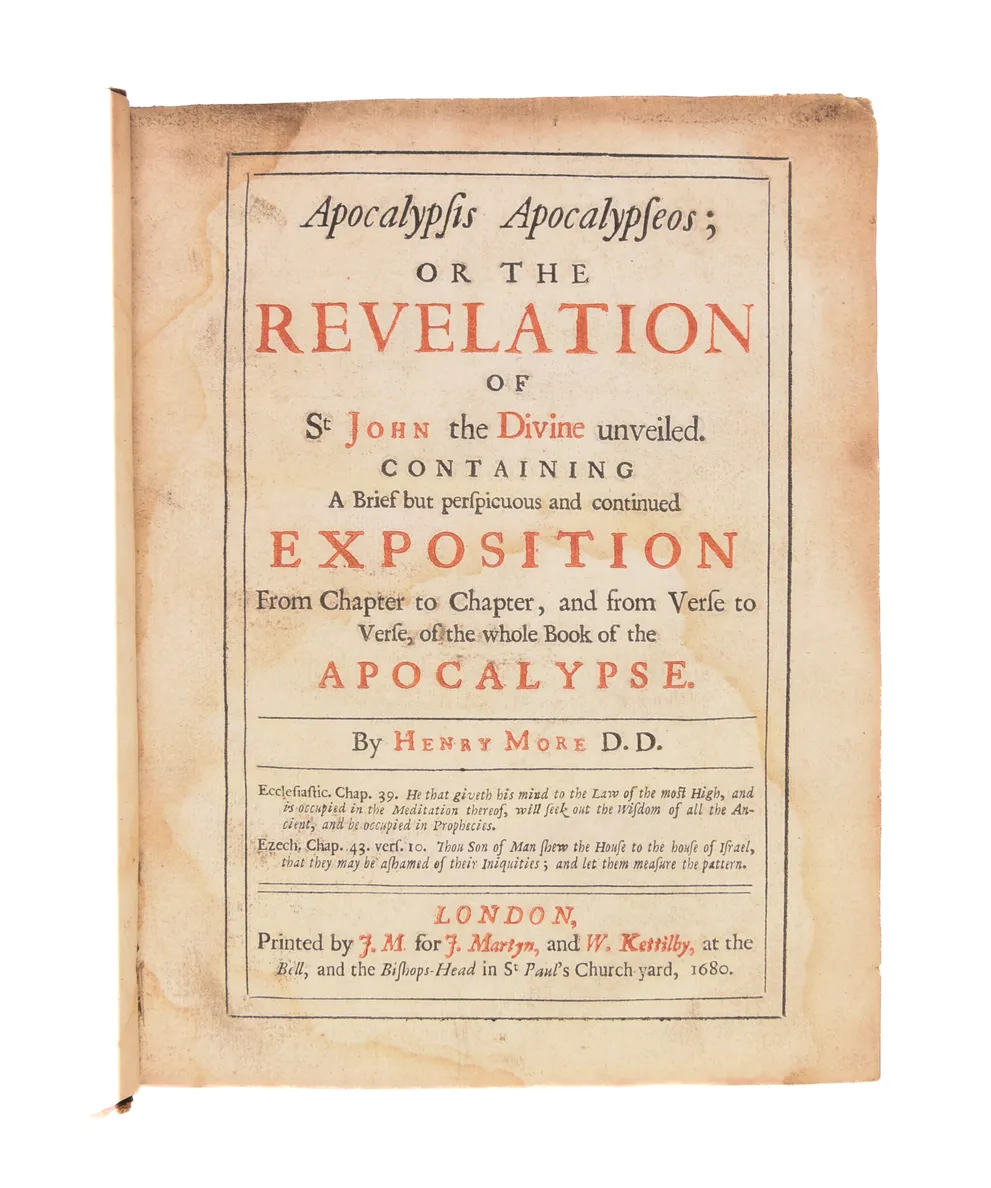Wing M2641.
From the parochial lending library of Trinity Church, Newport, Rhode Island, one of the first lending libraries established in America (the oldest surviving is the Library Company of Philadelphia found in 1731 and the oldest still in its original location is the Redwood Library & Athenaeum at Newport, RI, founded in 1747).
The congregation of Trinity Church was established in Newport in 1698 with the church building itself being completed c. 1702. The first minster was the Rev. David Bethune (1698-1700), the second John Lockier or Lockyer (1700-04) and the third the Rev. James Honeywood (1704-50).
J. F. Jameson, in "The First Public Library in Rhode Island" (Publications of the Rhode Island Historical Society, N.S., Vol. IV/4, January 1897, p. 227-9) printed three catalogues of books establishing a parochial library with two collections of books, one for the minister's use and the other for the parishioners that he had found in Dr Thomas Bray's papers, then at Sion College in London.
The first list, "A Catalogue of the Bookes sent to Rhode Island tow[ar]ds the Raising a Parochial Library for the Minister there sent the 19th of 8ber [October] 1700 By Mr Bethune Licens'd to be the Minister of yt Place." It comprises 17 titles in folio, 12 in quarto, and and 38 in octavo.
The second list, with the same date, is, A Catalogue of Bookes sent to Rhode Island for the founding a Layman's Library. The severall Books to be Lent or Given at the Discretion of the Minsiter and Delivered to Mr. Bethune October the 19th 1700. It lists 16 titles of which 9 had four copies and one had 100 copies "to be given outright".
The third list, dated 12 November 1701, is, "A Catalogue of the Books sent Nov 12th 1701 By Mr Lockier [Bethune's successor as Minister] to augment the library at Rhode Island in America." It lists 6 titles, including Henry More's Opera Theologica et Philosophica (3 vols., folio). That is followed by an entry which what may possibly include the present volume: "Apocalyptical Discourses 5 Vol. 4to."
The books had been sent to Newport at the behest of the Rev. Dr Thomas Bray (1658-1730), founder of the Society for the Promotion of Christian Knowledge in March 1699 and its off-shoot the Society for the Propagation of the Gospel in Foreign parts founded in June 1701, who had been the promoting the establishment of parochial libraries in America and the recruitment of ordained ministers to emigrate there from around 1695/6. In his printed Proposals for the Incouragement and Promoting of Religion and Learning in the Foreign Plantations; And to induce such of the Clergy of this Kingdom, as are Persons of Sobriety and Abilities, to accept of a Mission into those Parts (undated, but December 1695), Bray proposed that every Parochial Minster should have, "a sufficient Library of well-chosen Books, ... in which he might spend his time to his own Satisfaction and with Improvement and Profit to himself and others." He specified that a "decent and large room" should be provided in the Parsonage-House, that a catalogue should be made and the books checked at least every three years and that the Minister or his successors should "make good what Books shall be Imbezelled or Lost by his fault." He further proposed:
"THAT for further Security to preserve them from Loss and Imbezelment, and that they may be known where-ever they are found, in every Book; on the one side of the Cover, shall be Letter'd these Words, SUB. AUSPICIIS WILLIELMI III. on the other side the name of the Parish to which their Books do belong: EX. GR. BIBLIOTHECA DE MARY-TOWN: E. BIBLIOTHECA DE JAMES-TOWN, &c."
Thomas Bray established a total of 39 libraries in America and 80 in England and Wales. In his book, Bibliothecae Parochialis &c. Or a Scheme of such Theological and Other Heads, as seem requisite to be perus'd, or occasionally consulted, by the Reverend Clergy (2nd edn, London: 1707), Henry More's Apocalypsis Apocalypseos was listed among the recommended books of commentary, "On the Apocalypse, and the Apocalyptical Writings." (p. 129).
It may be (though it is probably a confusion with the original 1700/01 gifts) that the Trinity Church library was further supplemented in 1704. In his History of Rhode Island (New York, 1853), the Rev. Edward Peterson noted that:
"In the year 1702, when the Society for Propagating the Gospel in Foreign Parts, was established and incorporated in England, the Warden of Trinity Church applied to the Bishop of London, soliciting the aid of the Society; on which application the Rev. James Honyman [sic for Honeyman] was appointed Missionary in 1704, and sent over to the station. The Society, as a further encouragement, sent also as a present to the Church, a valuable library of the best theological works of that day, consisting of seventy-five volumes, mostly folio. Many of these books are still in the possession of the Church.," (p. 308).
From the beginning, then, at least some of the books in the Trinity Church library were available for lending to the parishioners. It would seem, despite Bray's precautions, that the library was soon in a state of disarray for, on June 20th, 1709, at a meeting of the Vestry at the church the following resolution was agreed:
"That ye Books belonging to ye Library of ye Church which have been Lent out be all called in & Public notice of this be given to those who have them. By Placards Affixed to the Church Dores & when they are come in a Survey to be made of ye said Library." - George Champlin Mason, Annals of Trinity Church, Newport, Rhode Island. 1698-1821 (Newport, RI, 1890), p. 18.
The 1709 recall of the scattered books must have been largely successful as today 36 volumes (including four others by Henry More), all similarly lettered in gilt on the front cover as here, survive together in the library of the Newport Historical Society as detailed on their online web inventory - https://collections.newporthistory.org/themes/nhs/assets/pawtucket/graphics/WebInventory2018-07-03.xls
We have traced one other escapee from the collection. A copy of George Keith's The Standard of the Quakers Examined (London, 1702), similarly lettered in gilt on the front cover, though with the spelling "ROAD ISLAND", and using the same capital 'Q' in place of 'O'. This does suggest that the lettering was added in Newport by a local binder. A London binder would have had no trouble replacing a lost or broken 'O'. This was sold at Swann Galleries, New York, 4 Feb. 2016, lot 242, $2600. It had, as does the present volume, the modern bookplate of the Rev. Lloyd Dudley Rapp (1917-1999), assistant minister at Trinity Church from 1944 to 1946. The present volume was sold at an auction in Germany in 2022.


